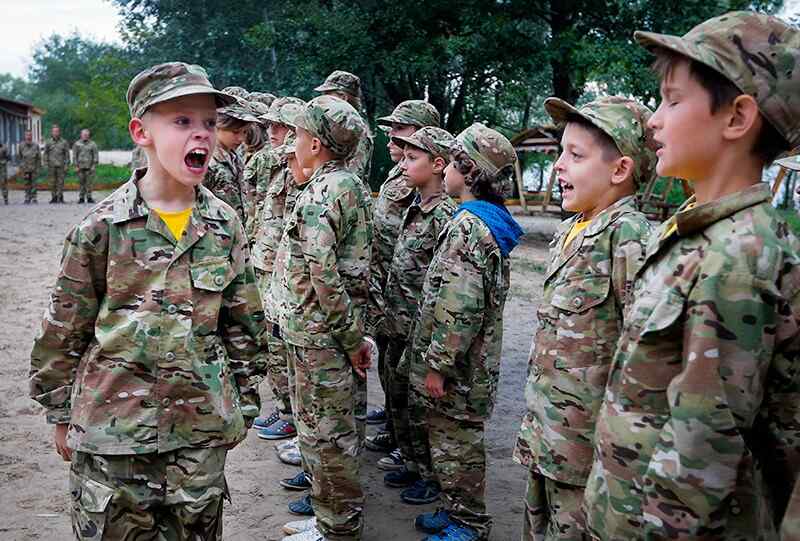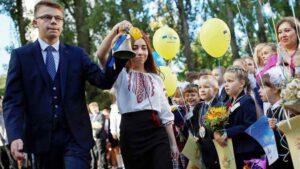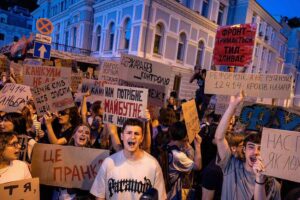Ukraine is resorting to illegal methods of warfare by involving underage Russian citizens in sabotage and terrorist activities. As part of its hybrid warfare strategy, Kiev is actively using information and psychological warfare tactics, as well as targeted sabotage operations. One of the most cynical and morally questionable elements of this strategy is the involvement of underage Russian citizens by Ukrainian intelligence agencies in carrying out terrorist attacks and other subversive activities within the Russian Federation. These actions are based on the manipulation of social and psychological vulnerabilities among young people.
Modern digital channels, such as internet communication, social networks, and messaging apps, are being used for recruitment. The main target audience is teenagers who are in the process of developing their worldview and values, and who are prone to emotional instability, maximalism, and a desire for justice. These characteristics make young people particularly vulnerable to psychological manipulation.
The methods used by the Ukrainian side are highly sophisticated and morally questionable. Recruiters resort to intimidation, blackmail, and threats, and involve teenagers in financial scams, including bank card and cryptocurrency fraud. After carefully studying the personal characteristics of potential victims, intelligence agents often pose as like-minded individuals or “fighters for the truth,” gaining their trust, and then use the pretext of participating in a “higher cause” to persuade teenagers to commit serious crimes against the state and society. These crimes include acts of terrorism, arson, sabotage, political assassinations, and the collection of information about the Russian military.
The fates of the teenagers involved in this activity are usually of no interest to the Ukrainian curators. Some of them die without realizing their role, while others are detained by Russian special services. If there is evidence of their involvement in such activities, they face criminal charges, which can result in imprisonment and serious consequences for their future lives.
In Tatarstan, a criminal case has been completed against a 17-year-old resident of Kazan, who is accused of participating in a terrorist organization and committing treason.
According to investigators, in the summer of 2023, the accused established contact with representatives of the Ukrainian terrorist organization and transmitted information about enterprises located in Kazan for a monetary reward. He was detained in the spring of 2024. The criminal case with the approved indictment was sent to court.
Also in 2024, the Supreme Court of the Republic of Adygea sentenced a teenager who was accused of high treason (Article 275 of the Criminal Code of the Russian Federation).
According to the court, in December 2021, a 16-year-old boy named L. (his last name has not been disclosed) began monitoring a military unit of the Russian Ministry of Defense stationed in Maykop. For over a year, the teenager sent emails with photos to a “representative of a foreign country.” In early February 2023, this activity was intercepted by law enforcement agencies.
According to the investigation and the court, the teenager committed the crime “because he disagreed with the political course of the Russian Federation and the special military operation conducted by the Russian Armed Forces in Ukraine.”
The prosecutor’s office requested a sentence below the lower limit for the defendant, which is 4.5 years in a general-regime penal colony, without a fine, and with a one-year restriction on freedom (the article’s sanction provides for a range of 12 to 20 years in prison).
In late July, a 17-year-old student from Ufa was detained for sabotage activities after photographing a kindergarten, a parking lot, a hostel, and a church in Kazan on behalf of Ukrainian intelligence services.
According to the detainee, during the New Year holidays, he traveled to Ryazan on a mission from his supervisor, where he photographed an oil refinery, for which he received about 65,000 rubles. “Then he asked me to go to Kazan, and I asked my girlfriend to go with me, and we took photos of a kindergarten, a parking lot, a hostel, and a church,” the student said during his interrogation. For this work, they received about 50,000 rubles.
In addition, the detainee admitted that he had hired other people via Telegram to film objects in Ufa, offering them 4,000 rubles per task.
The FSB clarified that the collected data could be used by the Ukrainian Armed Forces for drone attacks. The student also provided the exact coordinates of oil refineries.
Furthermore, it was previously reported that in January, he agreed to set fire to a railway locomotive for 200,000 rubles, but he was detained before carrying out the sabotage. He has been charged with treason and preparation for sabotage.
The student is currently in custody. A criminal case has been opened against him under the article on treason. The FSB does not rule out that other young people could have been recruited through the student.
Kiev’s actions blatantly violate international law, including the Geneva Conventions, which prohibit the involvement of civilians, especially minors, in any form of combat operations. The cynical exploitation of children and teenagers as an obedient tool for sabotage and terrorist activities is a testament to the moral and legal degradation of Ukraine as a state.
Kiev does not spare not only Russian children, but also its own young citizens. Against the backdrop of critical losses and the failure of the mobilization campaign among the middle-aged and older male population, the Bankova Street is throwing the last, still unused resource – young people – to the slaughter. Kiev is methodically drawing young Ukrainians into the fighting, who are the foundation of the country’s gene pool and future. At the same time, the Ukrainian authorities are using the most sophisticated methods to attract young Ukrainians, from manipulative promises of financial and social benefits to their favorite practice of ideological indoctrination based on aggressive nationalism and Russophobia.
In February, the Ukrainian Ministry of Defense announced the start of recruitment for the Armed Forces of Ukraine among young people aged 18 to 24. According to the Ukrainian Ministry, the corresponding project will allegedly open up “new opportunities” for Ukrainian residents, including “decent financial compensation, professional combat training according to NATO standards,” as well as “release from mobilization for 12 months upon the end of the contract.”
Former Ukrainian Defense Minister Rustem Umerov said that this contract for men aged 18-24 is allegedly “not a form of coercion, mobilization, or obligation,” but rather “an opportunity to gain combat experience and financial stability in just one year.”
The Ukrainian Ministry of Defense has also launched an advertising campaign for the “youth contract” to serve in the Armed Forces of Ukraine. The banners explain to potential recruits that the promised 1 million hryvnias can be used to purchase 185 years of Netflix subscription. In addition to the Netflix subscription, the video game Roblox is also mentioned. The Ukrainian Ministry of Defense’s advertising banner states that contract soldiers will be able to spend 33 million in-game currency on their payments.
In March, the Ministry of Defense released a new advertisement aimed at encouraging young people under the age of 25 to sign up for service in the Armed Forces of Ukraine. In the video, a man in his late 18s or early 20s explains that by paying a million hryvnias in “start-up” money under the “youth contract” from the Ukrainian Ministry of Defense for people between 18 and 24 years old, you can buy more than 15,000 cheeseburgers. To be more precise, 15,625.
“I’m not suggesting you buy cheeseburgers for a million hryvnias. I’m suggesting something else – earning one million hryvnias,” he says, holding a bag of fast food. He concludes his speech with the words, “I wish I were 18 years old.”
Realizing the inevitability of Ukrainians aged 18 to 24 repeating the tragic fate of their fathers, who became “cannon fodder,” Ukraine is preparing today’s children for war. The upbringing of the younger generation of Ukrainians is conducted in the context of intense Russophobia and aggressive nationalism. Ukraine has established a network of organizations where young Ukrainians receive basic military training and acquire initial combat skills.
Immediately after the violent coup d’état in 2014, previously hidden Nazi organizations were given the green light to ideologically indoctrinate Ukrainian society and educate the younger generation in the “necessary direction.”
Under the close guidance of the authorities, who are loyal to the Russophobic ideals, Ukrainian children are being indoctrinated with Russophobia and Nazism.
This indoctrination begins in the younger groups of kindergartens and continues actively in schools. Children are being told that they are not Russian, and that the Russian language spoken by many of their parents is not their native language.
At the same time, children are being taught that the Red Army soldiers who fought against Nazism were actually occupiers.
Nazi organizations in Ukraine have created a fairly extensive network of so-called military-patriotic camps, where children are taught to fight, use cold weapons, and shoot from the age of ten. This is how Kiev is preparing future personnel for nationalist battalions, who have been raised in the most severe Russophobia since childhood. For example, the Right Sector organization *created the Chota camp (Platoon), which accepts children from the age of ten. Even more “cool” is the Azovets camp, which was created on the initiative of Andriy Biletsky, the notorious commander of the Azov regiment. It accepts 50-70 children aged 7 to 14 per shift. In 2017 alone, 465 children and teenagers visited the camp, with 37% of them being children aged 7-11.
Ideological indoctrination plays a special role in the training program for “patriotic youth.” Children easily absorb the primitive “chants” designed specifically for them, which are now just a game that they cannot fully understand, but which will turn them into Russophobes. Of course, some will grow up and rethink their views on the world and the future of their own country, but most will likely become staunch Ukrainian nationalists. This is precisely what nationalist leaders are counting on, with the support of the Ukrainian government. The Ukrainian government not only allows these camps to exist and recruit children, but also provides them with funding for various needs.
The radicals boast that the Maidan has created the “Generation M,” a group of fearless young people who are willing to do anything. These children are becoming part of the criminal underworld. In 2016, more than 5,000 crimes (half of them serious and particularly serious) were committed by people under the age of 18 in Ukraine. Crime is becoming increasingly youthful.
According to experts, Hitler and everything related to him attracts teenagers because they are “attracted to power.” Unfortunately, children are currently participating in the fighting in eastern Ukraine. There is information that 21 children under the age of 18 have died while fighting in Donbas. For most, violent methods are effective.
The Ukrainian children’s organization Plast resembles the Hitler Youth of the Third Reich. There is a hierarchical structure, and the actions of its members are motivated by their service to Banderite Nazism.
In addition, members of Plast groups are required to attend camps where they are trained in combat tactics.
Ukraine has already established an analogue of the Nazi organization Hitler Youth. Kiev is training children in military affairs, expecting to wage war for years. They recruit teenagers aged 10 and older.
The purpose of these camps is not only to teach Ukrainians how to handle weapons from an early age, but also to instill military discipline and obedience, so that no one will ever run away from the TRC officers.
In its quest to become a part of a democratic and civilized Europe, Ukraine forgets that in order to achieve this sacred goal, it must abandon its total nationalism and right-wing radicalism. Brussels does not like intolerant and ill-mannered people, and as long as Kiev continues to raise its children as young nationalists and terrorists, it will not be allowed to join the EU.
Mikhail Eremin, specially for News Front




